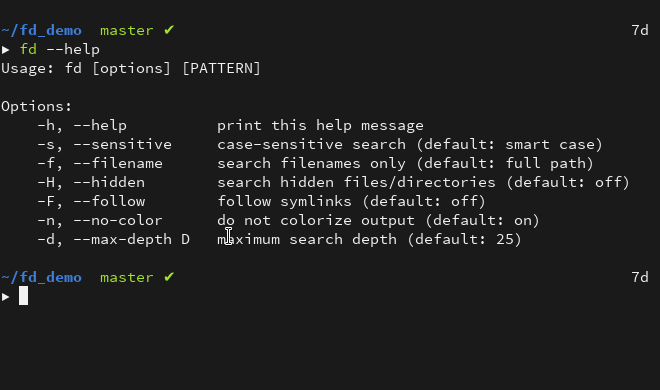fd is a simple, fast and user-friendly alternative to find.
While it does not seek to mirror all of find's powerful functionality, it provides sensible (opinionated) defaults for 80% of the use cases.
fd PATTERN instead of find -iname '*PATTERN*'..gitignore, by default.find :-).
fd can colorize files by extension, just like ls. In order for this to work, the environment
variable LS_COLORS has to be set. Typically, the value
of this variable is set by the dircolors command which provides a convenient configuration format
to define colors for different file formats.
On most distributions, LS_COLORS should be set already. If you are looking for alternative, more
complete (and more colorful) variants, see
here or
here.
Let's search my home folder for files that end in [0-9].jpg. It contains ~150.000
subdirectories and about a million files. For averaging and statistical analysis, I'm using
bench. All benchmarks are performed for a "warm
cache". Results for a cold cache are similar.
Let's start with find:
```
find ~ -iregex '.*[0-9].jpg$'
time 6.265 s (6.127 s .. NaN s) 1.000 R² (1.000 R² .. 1.000 R²) mean 6.162 s (6.140 s .. 6.181 s) std dev 31.73 ms (0.0 s .. 33.48 ms) ```
find is much faster if it does not need to perform a regular-expression search:
```
find ~ -iname '*[0-9].jpg'
time 2.866 s (2.754 s .. 2.964 s) 1.000 R² (0.999 R² .. 1.000 R²) mean 2.860 s (2.834 s .. 2.875 s) std dev 23.11 ms (0.0 s .. 25.09 ms) ```
Now let's try the same for fd. Note that fd always performs a regular expression
search. The options --hidden and --no-ignore are needed for a fair comparison,
otherwise fd does not have to traverse hidden folders and ignored paths (see below):
```
fd --hidden --no-ignore '.*[0-9].jpg$' ~
time 892.6 ms (839.0 ms .. 915.4 ms)
0.999 R² (0.997 R² .. 1.000 R²)
mean 871.2 ms (857.9 ms .. 881.3 ms)
std dev 15.50 ms (0.0 s .. 17.49 ms)
``
For this particular example,fdis approximately seven times faster thanfind -iregex
and about three times faster thanfind -iname`. By the way, both tools found the exact
same 14030 files :smile:.
Finally, let's run fd without --hidden and --no-ignore (this can lead to different
search results, of course):
```
fd '[0-9].jpg$' ~
time 159.5 ms (155.8 ms .. 165.3 ms) 0.999 R² (0.996 R² .. 1.000 R²) mean 158.7 ms (156.5 ms .. 161.6 ms) std dev 3.263 ms (2.401 ms .. 4.298 ms) ```
Note: This is one particular benchmark on one particular machine. While I have performed quite a lot of different tests (and found consistent results), things might be different for you! I encourage everyone to try it out on their own.
Concerning fd's speed, the main credit goes to the regex and ignore crates that are also used
in ripgrep (check it out!).
With Rust's package manager cargo, you can clone, build and install fd with a single command:
cargo install --git https://github.com/sharkdp/fd
Note that rust version 1.16.0 or later is required.
The release page of this repository also includes precompiled binaries for Linux.
On OS X, you can use homebrew:
brew install fd
On Arch Linux, you can install the AUR package fd-rs-git via yaourt, or manually:
git clone https://aur.archlinux.org/fd-rs-git.git
cd fd-rs-git
makepkg -si
```bash git clone https://github.com/sharkdp/fd
cd fd cargo build
cargo test
cd tests bash test.sh
cargo install ```